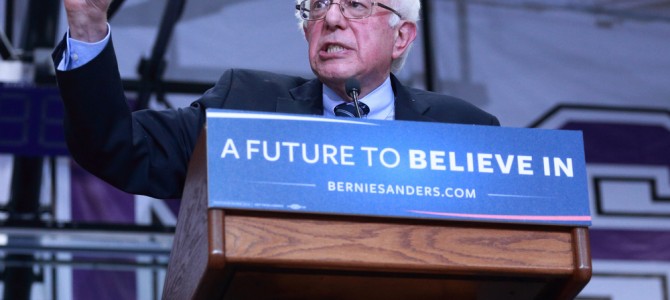
Call it “democratic socialism” to make yourself feel better, but what we have is an old hippie regurgitating cut-rate Lenin. And it’s obvious — especially when contrasted with the Democrat alternative — this kind of radical idealism is what really propels the Democratic Party.
No one seems too concerned about this development. Before last night’s debate, for example, the media were getting pretty worked up about a new Bernie Sanders spot called “Together.” Setting aside my personal contempt for its creepy authoritarian vibe, I can see how the ad clues us into why many liberals are taken with Sanders’ candidacy. An ad like “Together” would seem calculated and vacuous coming from Hillary Clinton. It would have been perfect for 2008 Obama. It definitely works for Sanders.
It’s not even close. This @BernieSanders spot is the best political ad of the season. https://t.co/fPXebdua7J–Noah Shachtman (@NoahShachtman) February 11, 2016
Because like the president, Sanders pins his aspirations to a movement, not merely himself. Which is always intriguing to younger voters. Then again, quixotic voters are intrigued by all kinds of dumb ideas. Utopianism is intriguing. Equality is intriguing. Unity is intriguing. “Our job is not to divide. Our job is to bring people together!” Sanders roars in the ad. All genders, ethnicities, races, ages, and sexualities will meld into one and force government to “work” for everyone. The thing is, if we weren’t divide by our gender, race, class, and sexual orientation, Democrats wouldn’t win any elections.
The entire edifice of contemporary progressivism rests on identity politics and class envy. The idea that more economic coercion — not to mention the moral coercion that often goes along with it — is going to bring Americans together is as preposterous now as it was eight years ago.
That’s far from the worst part. Events can always alter the dynamics of American politics, but right now Sanders represents the natural trajectory of liberalism. Where else did people think eight years of relentless fearmongering about the inequities and corruption of capitalism would lead? You can’t keep blaming everything on the inherent racism in America and not expect your party to radicalize. You can’t accuse oil companies of bloodlust and not mainstream the idea of nationalizing the energy sector. You can’t blame every economic tribulation on Wall Street and bankers and the Koch Brothers and then be surprised a major candidate ends up railing against “speculators” and argues that the entire business model of modern banking is a “fraud.”
Yet, there isn’t much policy debate on the Left. There is an electability debate. And it’s about who is more realistic and who can get things done. It might be true, as Hillary contends, that choosing her is choosing a continuum of Obama’s policies. But she’s a lagging indicator of political trends. Right now progressives seem less interested in conserving gains than embracing the promise of more revolutionary change. Hillary can’t move left fast enough.
Compared to the Republican debate brawls, Clinton and Sanders agree on so much.–Nicholas Kristof (@NickKristof) February 12, 2016
So there are lots of grievances. There are a lot of victims. And there is a bunch of people standing in the way. What there isn’t is any ‘togetherness.’
“It’s one of the few regrets of my presidency — that the rancor and suspicion between the parties has (sic) gotten worse instead of better,” was the admission the president made at the State of the Union. The other day he groused about the “divisiveness” and “meanness” that have emerged under his presidency. Liberals will doubtlessly blame all this on inherent bigotry and unfettered selfishness. But uncompromising policies are typically met with uncompromising resistance. This is the lesson of the Obama era.
To be fair, Sanders doesn’t have the president’s touch when it comes to identity politics. He may struggle with the black vote. Numerous times during the debate, Hillary attempted to attack Sanders for his lack of loyalty to the president. A “low blow,” Sanders called her sharpest attack, before pointing out that only one of them had actually run against Obama. Anyway, Sanders explained, his opposition wasn’t aimed at the spirit of the president’s agenda, but rather the speed and potency.
But Sanders is a quick study. A couple of days after his win in New Hampshire, he went to Harlem to grab breakfast with noted racist and extortionist Al Sharpton. The two dined at Sylvia’s, the same spot Sharpton met Obama during his 2008 presidential campaign. In this era, a person may be drummed out of polite society for presuming that “all lives matter,” but a contemptible anti-Semite on the appropriate side of a progressive grievance can become a king maker.
Fortunately for establishment Democrats (I assume most still do not believe Sanders can win in the general), some delegates are more equal than other delegates. Unlike Obama’s ascent, there is little chance that Sanders can pull it off, and consequently even less chance that donors and endorsements will go his way. But if not Sanders, someone very much like him — maybe more charismatic, articulate, and younger — will show up the next time around.
Of course, from where I sit, this all looks unmoored from anything remotely American. On Thursday night, Sanders was asked how big the federal government would be under his stewardship. Let’s put it this way: Sanders does not believe in limiting principles. And, really, after eight years of attacking those who believe in them, what did we expect?









